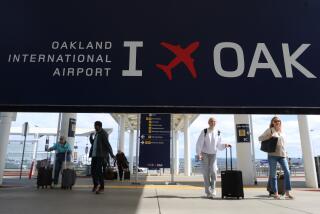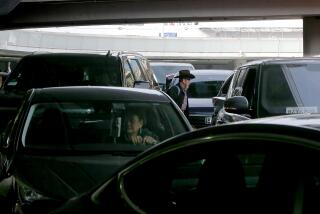Airports Plan New Try to Bar Soliciting : Transit: The proposal, based on a recent Supreme Court ruling, would affect terminals at LAX and Ontario.
Armed with a favorable U.S. Supreme Court decision and itching to eradicate an 18-year-old nuisance, the Los Angeles Department of Airports is preparing once more to try to kick beggars out of its terminals.
The Board of Airport Commissioners today is scheduled to consider a proposal to forbid soliciting or accepting money in the terminals of Los Angeles International and Ontario airports. Violators could be liable for civil sanctions and arrest.
The proposed resolution, which is based on a June Supreme Court ruling that upheld a New York solicitation ban, would let the airport seek civil injunctions against people soliciting inside terminals--a move that would allow airport police to eject them.
“The benefit is that you get (solicitors) away from the stream of traffic in the terminal,” said Senior Assistant City Atty. Gary R. Netzer, the Department of Airport’s legal adviser.
Officials also said the ban would protect visitors from being hoodwinked by dishonest solicitors.
Whether solicitors actually disrupt or delay travelers is contested by Century City lawyer Barry A. Fisher, who has fought Los Angeles airport officials over solicitation for nearly 20 years. Insisting any ban would violate state law and the federal Constitution, Fisher said he may use the disruption issue to challenge any new restriction.
“There (are) claims of problems and disruptions and people missing planes . . . but L.A. has proven none of that,” Fisher said.
Airport officials said the proposed ban would not restrict fund raising on sidewalks outside airport terminals and would not make soliciting a crime.
In 1974, Fisher represented members of the International Society for Krishna Consciousness in a successful court challenge of LAX rules. Fisher also prevailed in 1978 on behalf of a Hare Krishna member accused of criminal soliciting in the airport. In 1987, Fisher successfully argued before the U.S. Supreme Court to overturn an LAX regulation that essentially suspended the First Amendment on airport property.
Fights over airport soliciting have spread in the intervening years to cities from San Juan, Puerto Rico, to Anchorage, Alaska. Lower courts have maintained that people were free to solicit and proselytize in airport terminals because they are public places.
But in June, on a 6-3 vote, the Supreme Court finally ruled against Fisher and his Hare Krishna clients. Upholding a New York ban, the high court said that soliciting in airports infringes on the basic function of the facilities--getting passengers to planes.
In a separate 5-4 decision, the high court affirmed the right to collect petition signatures, distribute flyers, sign up members and conduct other free-speech activities inside terminals.
Krishna members no longer ask for donations at LAX, but Fisher represents the Church of the Soldiers of the Cross of Christ of the State of California, one of two groups that still solicit funds there. He said he already discussed with Rolando Gonzalez, a bishop in the Bell Gardens-based church, about how to challenge any new restriction.
LAX Assistant General Manager Shirley Flucus said Wednesday that neither the Bell Gardens group nor the Gospel Missions of America, another soliciting organization, comply with city regulations requiring them to apply for charitable permits and disclose how their donations are spent.
Representatives of the two groups could not be reached Wednesday, but they have claimed that as religious organizations they are exempt from such disclosure requests.
Airport patrons interviewed Tuesday evening seemed to give the solicitors little notice, even when they chose to drop a few coins or a dollar into their plastic buckets.
“Why did I give her money? That’s a bloody good question,” said one Australian traveler, who declined to give his name. “I’m going to London and I had some change in me pocket. This seemed like a good way to get rid of it. It can be a nuisance, I suppose, but it seems to be a good cause.”
More to Read
Start your day right
Sign up for Essential California for news, features and recommendations from the L.A. Times and beyond in your inbox six days a week.
You may occasionally receive promotional content from the Los Angeles Times.






